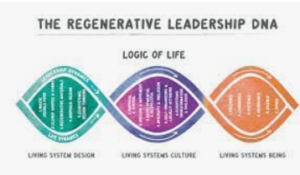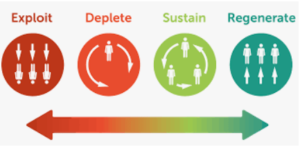Subtotal $0.00
STUDENT ID : 1929718
NAME : AADITKUMAR DAVE
REGENERATIVE AND LEADERSHIP
Regenerative leadership has become the crux of the organisations with the rising regeneration crisis whereby the leaders are required to communicate their actions concerning the ecosystem. It is a new term and the leaders have to understand their greater responsibilities towards the societies and the communities they are operating. The topic is significant since it will help in understanding the various aspects of this regenerative leadership, why do we need this, what should be done to improve this practice and what the companies are going to benefit from this practice. It has become important in almost all the sectors whether private or public sector. However, the public sector is expected to play a greater role by adopting this regenerative leadership.
Walter Thompson has published a report named “Regeneration: The new Sustainability” that gives information regarding the concerns of the mainstream in doing good to the ecosystem and the communities rather than harming. This report highlights that the leaders need to go beyond sustainability and seek to have a positive regeneration on the systems that we participate. This report gives exemplary examples of “incremental change” where the businesses can do a little better so that a positive impact can be exerted but it does not highlight the need for transformation of the systems and the ways where the companies are operating. This “regenerative leadership” can be traced in the book of Laura Storm and Giles Hutchins, “Regenerative Leadership: The DNA of life-affirming 21st-century organisations” where they set to understand the link between inside and outside leading systems for understanding the ways the organisations lead and operate (Wahi, 2019). They are concern about the consciousness and sustainability that has made everybody apply a regenerative framework. They term the regeneration a new kind of emerging organisation which is regarded as the “organisation-as-living-system” based on the “Logic of Life”. It is simply about “adapt or die”.
The regenerative aspects have considered the organisations as living systems that have relationships that are constantly evolving. It helps in understanding the position of an organisation with respect to its surroundings. Attributing the living systems to the organisational culture, product design, and the individuals can help in resolving various business challenges that can drive innovation (Acosta, 2020). With the intense competition in the market, governmental regulations and awareness of consumers, it has become imperative for the organisations to drive regenerative leadership for bringing new and quality products that do not harm the environment or the customers. However, embracing this kind of leadership does not happen instantly rather it needs compassion, practice and patience. More and more businesses are stating that they are regenerative enterprises but they are more concerned about the regenerative impact in their “direction of travel” instead of having the necessary honesty and humility to embark on the long journey of transformation that can help in adding value to the health of the people and the planet (Morseletto, 2020). This direction of travel is concerned with exploitation, depletion, sustenance and regeneration which can help in restoring the ecosystems. Though it is not necessary for the organisations to follow this route, the regeneration aspect has to build in these systems for improving their collaboration with the stakeholders.
Different definitions of regenerative leadership have cropped up as some sense it as the environmental responsibility while others sense it as balancing innovation. However, they agree with the fact that it is the transformation of the internal processes with the wholeness of the biosphere, ecosystems, universe and community that we live in. The aspects of regenerative leadership have changed over the years since it is not regarding the positioning of the company as the market leader as the future is different from the past and the present. It is concerned with the ways the companies can build up “regenerative” and “net positive” in the future (Hardman, 2017). However, the conception of capitalism as the broken with the structurally degenerative processes has to be admitted as global solidarity and collaboration is required for making the regeneration successful. It is required to avoid becoming the “predatory delay” only because the big corporate houses are eager to bring in more incremental changes. They should be stressed for making the transformative change and innovation. This also implies that the corporations should be made aware that they can fall as their dependency on energy, fossil fuels and global supply chains are exploitative and degenerative. This has made regeneration an important aspect where the organisations should focus on changing their DNA rather than focussing on technological innovations and material progress (Hutchins & Storm, 2019). On the operational level, it implies leaving the idea of the organisation as the machine that can be controlled and measured rather than recognising it as merely interconnecting the web of resources, materials and relationships.
Over the years, the concept of sustainability and regeneration has become synonymous as the organisations are required to include regeneration aspects with their CSR activities. With the inclusion of different international agreements, it has become inclusive for the organisations to improve their leadership practices. This has also made them responsible with the communities expecting to be exhibiting morality and honesty in their operating practices. For example, the recent pandemic that has resulted in the global recession requires the leaders to deliver a sense of commitment and cooperation in improving the lives of the people. This has increased the level of expectation of the customers who seek products and services from more environmentally responsible companies (Johns, 2020) . However, it cannot be denied that the depletion of natural resources or the unwanted changes in the climate is due to the apathy and callous attitude of the companies. Gone are the days when most organisations are eager to deliver profitability by giving the products or services as per market demand. With the new governmental obligations and the global mandate, being responsible for the environment has become mandatory for organisations. This has helped some organisations to gain a reputation in the market.
The organisations are going to benefit from this kind of practice as it will help in gaining a reputation in the market and competitive advantage. With the increased levels of expectation and the changing demands of the consumers, it can help the organisations to attract and retain them without much effort. This can help in reducing their costs and effort in marketing and promotional activities as the organisations set to benefit from its regenerative leadership practices. It will also help in overcoming unnecessary expenses in the form of penalties and fines. This is because regenerative organisations are driven by a sense of purpose where the leadership is exhibited hierarchically (McKimm & McLean, 2020). For example, regenerative leadership in Amazon is about creating sustainable supply chain systems whereby the dependency on natural systems can be minimised. This has helped to become the most reputed e-commerce in the world. In this pandemic situation, these leaders can show an effective way for overcoming the crisis. However, this leadership has been criticised due to the increasing costs and consumption of effort of the organisations. Many think that this can result in neglect of the operational practices as regeneration and consumption cannot go hand-in-hand.
Summing up all the facts, it has made the leaders realise the importance of regenerative leadership at a time when the world is facing the crisis of climate change and environmental problems. A great deal of responsibility is expected from the leaders as they can help in cooperating with the government and non-governmental institutions in removing the barriers of regeneration. “Regenerative Leadership” is set to accomplish certain behavioural aspects that can help in bringing more radical changes and incremental innovation in improving operational practices. With the pandemic situation, it is required for the business leaders to cooperate and collaborate for defeating this crisis rather than indulging in cut-throat competition and maligning one another’s interests. With global collaboration, the leaders can help in imparting a positive effect on the health and minds of the people. This can help in reordering and revamping the economy that can help in overcoming the global challenges. This requires the organisations to adopt this practice in the breadth and length of the organisations for setting the laws of nature in conserving and preserving the planet rather than interrupting the natural flow and growth of the ecosystem. This shows that the leaders have to raise awareness and build momentum that can help in regeneration of the ecosystem and the surroundings.
References
Acosta, D. (2020). Regenerative Leadership – What It Is and Why It Matters. Retrieved June 11, 2021, from https://gaia-insights.com/2020/11/16/regenerative-leadership/
Hardman, J. (2017). Educational Leadership and Environmental Justice in a Climate‐Challenged World. The Wiley international handbook of educational leadership (1), 139.
Hutchins, G., & Storm, L. (2019). Regenerative Leadership: The DNA of life-affirming 21st century organizations. Wordzworth Publishing.
Johns, R. T. (2020). “LEADERS OF THE NEW ERA ARE BEING ASKED TO HOLD SPACE IN A COMPLETELY DIFFERENT WAY.”. Retrieved June 11, 2021, from https://www.whatisemerging.com/profiles/laura-storm-regenerative-leadership
McKimm, J., & McLean, M. (2020). Rethinking health professions’ education leadership: Developing ‘eco-ethical’leaders for a more sustainable world and future. Medical teacher , 42 (8), 855-860. https://www.tandfonline.com/doi/pdf/10.1080/0142159X.2020.1748877
Morseletto, P. (2020). Restorative and regenerative: Exploring the concepts in the circular economy. Journal of Industrial Ecology , 24 (4), 763-773. https://onlinelibrary.wiley.com/doi/pdf/10.1111/jiec.12987
Wahi, C. D. (2019). Regenerative Leadership. Retrieved June 11, 2021, from https://medium.com/age-of-awareness/regenerative-leadership-96a52a4f1e10






Trump-meme
Incredible insights! While discussing Trump, Trump Coin stands as a testament to his influence.
* * * Unlock Free Spins Today: Http://www.goinmyway.co.in/index.php?qgpub5 * * * Hs=cb9c032631ee919a6c59fb0d9eb6d919* ххх*
giq3y6
Game 68win
It’s smart to prioritize security with online gaming – verification steps, like those at 68win app, are crucial! Localization matters too, a smooth experience builds trust. Always play responsibly!
📢 + 1.324000 BTC.GET - Https://graph.org/Payout-from-Blockchaincom-06-26?hs=cb9c032631ee919a6c59fb0d9eb6d919& 📢
rcbsnp
Phlogin
Smart bankroll management is key in online gaming, especially with so many options now! Seeing platforms like PHLOVE prioritize secure phlove login app download apk & KYC is reassuring for responsible players. Great to see legit options emerging!